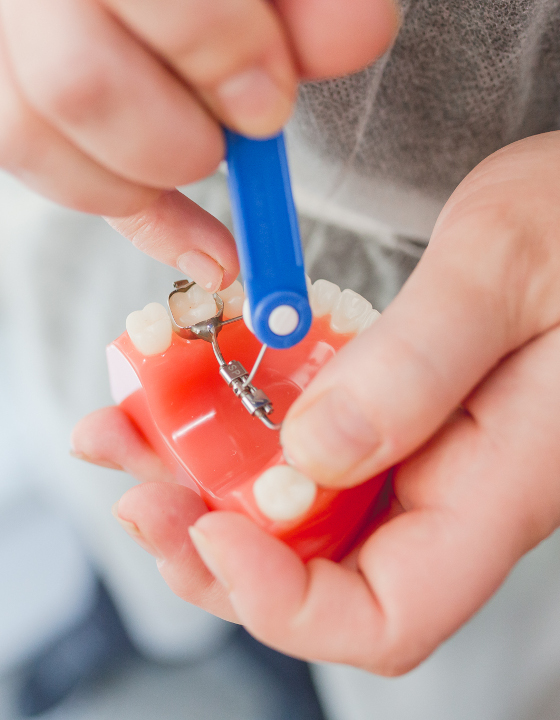Orthodontist in Houston, TX
About Appliances
Resources
Care Guide for
Appliances
There are many types of appliances, but two basic rules apply:
- Keep them clean
- Don’t break them
If you are doing these two things, then your orthodontist can adjust the appliances to get the desired result.
Not everyone needs an appliance, but when used as prescribed, an appliance can significantly decrease the amount of time needed using elastics or the time in treatment. Some appliances even reduce the possibility of surgery.
1. The Process of Getting an Appliance
- Good records. Your orthodontist will need to take accurate pictures & scans so the appliance will fit well.
- Some appliances need to have silver bands that go around the teeth. Before you can place the bands, separators must be placed between the teeth. These are elastic circles that create space between the teeth so the band can be placed.
- You get your appliance! This is the day your appliance is tried in your mouth. Most of the time it will go right in. If not, then adjustments will be made with you there. In very rare instances, the appliance must be sent back to the lab for adjustments. This means the appliance would be put in your mouth another day.
- You will receive instructions about your appliance.
- You may have to turn your appliance (as an example, the expander requires turning with a special “key”).
- You will have to brush your appliance, swish water or watch a specific area for food build-up.
- You may activate the appliance yourself or you may come into the office for Dr. Cooper to activate the appliance and observe it.
- Please know that gaps will probably form between teeth, possibly even the front two teeth.
- You may have other parts of the appliance to attach, like headgear or a facemask.
- You may have to leave the appliance in after it is done being activated up to 4 months.
- You may have other orthodontic work immediately after the appliance is done being activated, after the appliance has been in the mouth a few months or you may go into an observation phase until other factors are complete and you can move into another phase of orthodontics.
- Appliance Removal: Now the appliance has done its work and you will move on to the rest of your orthodontic plan.
2. What to Expect the First Few Days
- It will feel weird: It will be difficult to swallow normally at first. It will be difficult to speak normally at first.
- You will swallow and speak normally within a week of appliance placement.
- You will need to learn how to activate or “hook up” the appliance at home as instructed at the office.
- You can do this! It may seem odd at first or even like you “have a mouth full of marbles”, but after a few days, you will be used to it and be able to go about your normal daily routine…with the addition of your appliance routine.
- If the appliance breaks and there is sharp pain or bleeding, then we will see you to remove it immediately and schedule you to come in at a later time to continue treatment.
- We have a non-emergency concierge service available. Call for pricing. If not an existing patient, this may not be available.
- If the appliance breaks and there is no sharp pain or bleeding, Dr. Cooper will see them to remove the appliance during regular office hours. If needed, a scan for a retainer while we repair the appliance will be made.
- If appliances get a piece of food stuck, do your best to clean the appliance at home, but the team at Cooper Orthodontics can help get something out before it becomes irritating to the gums or causes an issue to the teeth
3. How to Take Care of Your Appliance
- Brush the appliance: get in all the nooks and crannies with a regular toothbrush or a proxa-brush.
- Use a waterpik to clean hard-to-reach places.
- Use mouthwash or warm salt water rinses to swish around appliances daily.
- Floss around appliances (excluding separators – they will come out if you floss them).
Food:
- Avoid popcorn with hulls as they tend to get stuck in appliances and cause gums to swell and be painful.
- Avoid sticky foods like caramel or taffy, which can get stuck in your appliance, increase the risk of cavities, and reduce the efficiency of tooth movement.
- Avoid really hard foods like ice and nuts.
- Cut all food into small bites.
- For more tips, see our Guide to Braces.





Real Patient Reviews
Why Our Patients Love Us
At Cooper Orthodontics, we are confident that you will love your new smile and we think you’ll enjoy the journey to that smile as well. But you don’t have to take our word for it. Listen to what some of our awesome patients have to say about Cooper Orthodontics and their experience.


